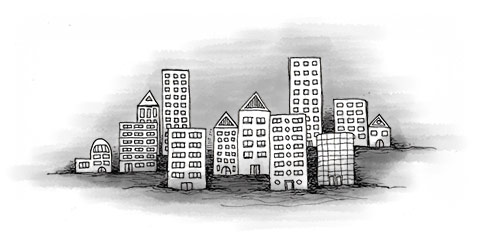The first thing you need to do is find out if you are responsible for paying your own utility bills. Some landlords pay the utilities themselves and build the cost into the rent. This is uncommon, but not unheard of. If your landlord handles the utilities, you should find everything working when you move into your apartment. If he does not, you will need to make arrangements to get service and pay bills yourself.
Electricity in Japan
There are nine different electricity (denki dai) companies in Japan, organized by geographic region. The largest of these companies is Tokyo Electric Power Company (TEPCO).
If you do not have electrical power when you move in, you will need to find the apartment or home´s circuit breaker. Flip the largest switch (the ampere breaker, or ampea bureeka) from ¨off¨ to ¨on.¨ This will turn on the power. There should be a small card somewhere near the breaker. Fill it out with the required information and mail it back to your regional power company (the card will usually be pre-addressed). This will allow the power company to establish an account in your name and bill you monthly for your electricity.
Electronics from your home country may require voltage and plug adapters. Electrical voltage in Japan is 100 volts – 50/60 Hz AC. 50 Hz is common in eastern Japan, including Tokyo, and 60 Hz in the west. The 10 Hz frequency difference does not affect most electrical devices, but you may want to check when it comes to valuable items, just to be sure.
Japanese outlets and plugs come in the two-pronged, North American style, but only in the non-polarized form (prongs are equal sizes). Therefore, some North American plugs may require adapters.
Gas
The gas (gasu dai) distribution is similar to electricity. When you move into your apartment you will have to call the gas company and arrange for an appointment. At the scheduled time, the company will send an employee who will check and then activate your gas lines. There are two different kinds of gas used in Japan. Check to make sure any new appliances that you purchase are compatible with your gas supply.
Water
You will have water service the moment you move in, but you will have to call the local water company to open a billing account. Use the water whenever you need to and you will be billed every two months.
How to pay your utility bills in Japan
To pay your utility bills, you simply have to supply your the electric, gas, and water companies with your bank account information. When the bill is due the money will automatically be deducted from your account.
If you would rather pay in person or if you are waiting to set up an account, you can pay bills at a post office or convenience store. Hand the clerk your bill and the amount due in cash and your payment will be processed. You can pay in the same way at your utility companies´ offices.
To stop your utility services when you leave Japan, notify each of the companies. The electric and gas companies will send representatives to shut off your service and issue your final bill. The water company will send you your final bill and close your account.
Garbage
Like many countries, Japan uses a system of garbage sorting. If you don´t properly sort garbage or you set garbage out on the wrong day you will probably irritate your neighbours, so if you´re unsure of something you should find out rather than guess at it. Garbage is sorted into the following categories:
- Burnable – Non-recyclable paper, wood, fabric, food
- Non-burnable – plastics, metals, cleaning products
- Recyclable – glass, tin, aluminium, newspaper, cardboard
Drink bottles and cartons can be recycled in bins found at local supermarkets. Garbage is usually collected once a week, except for burnable items, which are collected twice.
Garbage collection in Japan is free, you bring your garbage to your building or neighbourhood garbage collection site. Your garbage collection site will be located somewhere along your street, though you may have to walk a short distance to get there.

